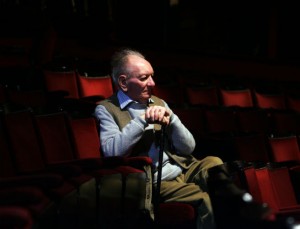 Brian Friel was barely more than a name to me when I became the drama critic of The Wall Street Journal in 2003. No play of his had been done on Broadway since Translations ran briefly there eight years earlier. Hence it came as a shock when I saw the Irish Repertory Theatre’s 2005 revival of Philadelphia, Here I Come! and realized at once that it was a work of the highest quality—a masterpiece, in fact. I resolved on the spot to see as many of his plays as I possibly could, and before long it was apparent to me that he and Tom Stoppard were the foremost living playwrights of the English-speaking world.
Brian Friel was barely more than a name to me when I became the drama critic of The Wall Street Journal in 2003. No play of his had been done on Broadway since Translations ran briefly there eight years earlier. Hence it came as a shock when I saw the Irish Repertory Theatre’s 2005 revival of Philadelphia, Here I Come! and realized at once that it was a work of the highest quality—a masterpiece, in fact. I resolved on the spot to see as many of his plays as I possibly could, and before long it was apparent to me that he and Tom Stoppard were the foremost living playwrights of the English-speaking world.
In due course I became, willy-nilly, something of an advocate for Friel. Not that he needed one—he is universally recognized in Ireland and England as a great writer—but his work has never been widely popular in the United States, and I have since done what I could to make it better known over here, covering twelve Friel revivals in The Wall Street Journal since 2003. As a result, I’ve already said in print most of what I would normally say in an obituary.
This passage from “Chekhov’s Fingerprints,” my 2009 review of the Florida Repertory Theatre production of Dancing at Lughnasa, sums up my feelings as well as anything:
Brian Friel, the greatest playwright of our time, is an Irishman whose works have the fingerprints of a Russian all over them. Anton Chekhov, Mr. Friel’s master, wrote plays in which plot takes a back seat to atmosphere, and Russia itself is always the star of the show. As Mr. Friel has pointed out, Chekhov’s flesh-and-blood characters “behave as if their old certainties were as sustaining as ever—even though they know in their hearts that their society is in meltdown and the future has neither a welcome nor even an accommodation for them. Maybe a bit like people of my own generation in Ireland today.” Might it be this transnational spirit that also makes Mr. Friel’s plays so accessible to American audiences and actors?…
A cross between Three Sisters and The Glass Menagerie, Dancing at Lughnasa is a semiautobiographical memory play whose narrator tells what happened to his family during two summer days in 1936. Young Michael lives in a cottage with Chris, his unmarried mother, and her four sisters, all of whom are barely making ends meet. The longings and frustrations of the Mundy sisters have grown too great to bear, and what was once a close-knit family is now—like Europe itself—on the verge of disintegration. The genius of Dancing at Lughnasa is that Mr. Friel has portrayed this sunset hour with the lightest of comic touches, letting the audience laugh as the black shadows that surround the Mundys grow imperceptibly longer.
Alas, there hasn’t been a New York production of any of Friel’s plays since 2012, when the Irish Rep staged The Freedom of the City, and none of them has been produced on Broadway since Translations was revived there in 2007. Perhaps his death at the age of eighty-six will lead to wider American interest in his work.
A personal note: it was Friel and Horton Foote, his opposite number on this side of the Atlantic, who initially inspired me when I first began to write for the stage. I shall always be grateful without stint to both men—neither of whom I ever had the privilege to meet—for what their example has meant to me.
The stage of the world feels empty this morning.
* * *
Excerpts from the 2006 Broadway revival of Faith Healer, starring Ralph Fiennes:
The opening of John Ousted’s 1974 film version of Philadelphia, Here I Come!, starring Donal McCann and Des Cave:
The trailer for Pat O’Connor’s 1998 film version of Dancing at Lughnasa, starring Meryl Streep:
